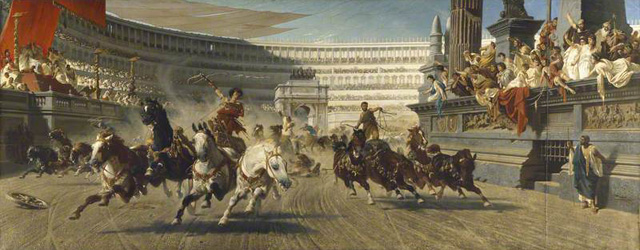The Chariot of Iscariot
At the last supper, as recorded in each of the four gospels, Christ made two predictions. The first was that one of their number, one they considered a friend and shared meals with, would betray Him. And of course we all know He was referring to Judas Iscariot, one of His disciples. He signified the inevitability of this prediction by quoting the prophecy from Psalm 41 which reads “the one who shared my food has turned against me.” In fact, John 6:64 makes it very clear that Christ knew all along who would betray Him. Even the price of His betrayal, 30 pieces of silver, was prophesied centuries earlier in Zechariah 11:12.
Judas was a man who was not free. His will was in bondage to his own sinful nature. It’s as if he was bound hand and foot, and chained to a chariot charging headlong toward destruction. He was unable to recognize his perilous condition, incapable of freeing himself from his bondage, and far from able to grab the reigns of his chariot and bring it to a halt, let alone turn it around. This is the condition of man described by Paul in Romans chapter 1. We are a rebellious people, driven along in bondage to sin, leading ultimately to all kinds of immoral and shameful behaviors. Judas had no interest or desire whatsoever to do what was right and was carried away into sin.
The other prediction Christ gave at the last supper was concerning His remaining eleven disciples. Christ told them that they would each desert Him and be scattered. In Matthew, He signified the inevitability of this prediction by quoting another prophecy from Zechariah which reads “God will strike the Shepherd and the sheep of the flock will be scattered.” Peter, who I believe we can agree was the most strong willed of the group, refused to concede. “Even if everyone else deserts you, I never will!” he exclaimed. Jesus reveals to Peter that his desertion will be the most egregious, for Peter will in fact deny that He even knows Jesus. And not just once, but three times. In Matthew we read that Peter vows this would never happen and in fact, all the other disciples vowed the same. Of course we all know they did scatter and desert Him when a throng of armed men led by Judas marched into the garden to arrest Him. And Peter, the most adamantly committed to his vow, did in fact deny Jesus three times.
You see, Peter and the rest of the disciples, just like Judas, were not free men. They were in fact, men in bondage to their own sinful natures. They were each bound hand and foot, chained to the same chariot which drove Judas so relentlessly. And like Judas, they were unable to recognize their perilous condition, incapable of freeing themselves, far from able to grab the reigns of this chariot and slow it down, let alone turn it around. This is the condition of man described by Paul in Romans chapter 2. These are those who say “We would never do those wicked things!”, the things mentioned in chapter 1, and yet they do them all anyway. Paul assures them that their punishment and destruction is assured just as much as these others. Peter and the disciples, had EVERY desire to do what was right but were carried away into sin regardless.
Jesus made it clear countless times throughout His ministry that salvation is from God. As Paul says in Romans 9:16, our salvation “depends not on human will or effort, but on God who has mercy.” Jesus tried to warn His followers that they were slaves to sin in John 8:34 but they refused to recognize their perilous condition, insisting that they were free men. Jesus then asks and answers his own question, “Why can’t you understand what I’m saying?” He answered “because you are unable to do so!” In fact, Jesus explained that this lie, this denial of our bondage to sin, shows us to be sons of our father the Devil for he is the father of this lie and all lies. In John 6:63 Jesus said “It is the Spirit who gives eternal life. Human effort accomplishes nothing” and in John 15:16 He tells His disciples “You did not choose me, I chose you.”
It is both the greatest comfort and the strongest assurance to affirm that I did not choose God, God chose me! My will and my choices are meaningless, insignificant, and utterly powerless. Jesus warns us not to make any vows in Matthew 5:36 because by our own will we can’t even turn a single hair on our head white or black. Instead, like Paul says in Philippians 3:3 “We put no confidence in human effort. Instead, we boast about what Christ Jesus has done for us.” I have been saved by the will of God and not by my own will and my salvation is as sure and eternal as the God who willed it. Paul challenges us in I Corinthians 4:7 to ask ourselves whether we have anything at all which we have not received as a gift from God. And if we have received it – all of it – as a free gift, why do we boast as if we have earned any part of it?
Leave a Reply

